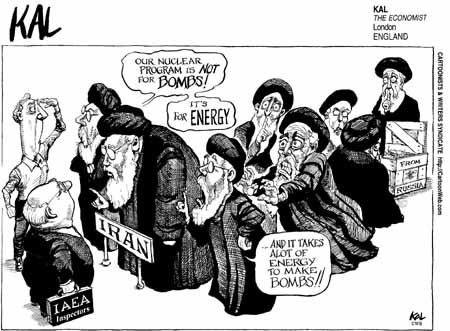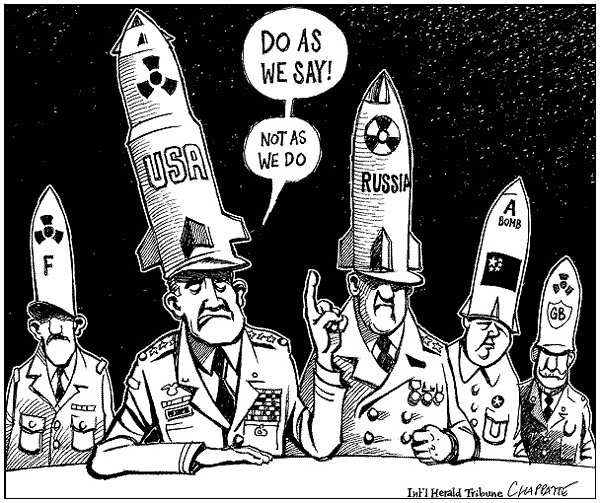
As we study the situation in Iran closely, I, like most of the world, are mistrustful of Iran. Iran will not allow the I.A.E.A. to inspect its nuclear program, and Ahmadinejad has stated openly that he wishes to destroy the country of Israel. In all of the research I did about Iran, the country seems to have only one argument as to why it should be able to construct a nuclear program. Iran argues that it has this right, as the U.S., Russia, France, China, Great Britain, and Israel all have their own nuclear weapons program. This idea makes these countries, especially the U.S., seem very hypocritical. This seems like a valid argument to make initially, but in the end, it is erroneous. Iran is trying to strengthen its argument by putting itself in the same category as all of those world powers, but is Iran REALLY in the same boat as them?
In an article from
The Washington Post that was written this month, the author discusses how America has protected and even helped supply Israel's nuclear program for over 40 years. Now, a lot of debate is going around regarding whether or not it is time to take away support of Israel's nuke program in order to shut down Iran's. This effort has been made many times, but Israel constantly refutes the idea. Two years ago, the Israeli Prime Minister Ehud Olmert justified this by stating, "Israel is a democracy, Israel doesn't threaten any country with anything, never did. The most that we tried to get for ourselves is to try to live without terror, but we never threaten another nation with annihilation. Iran openly, explicitly and publicly threatens to wipe Israel off the map. Can you say that this is the same level, when they [Iran] are aspiring to have nuclear weapons, as America, France, Israel, Russia?"
I think this is a valid point, and really checks Iran about the idea presented above regarding the category that the country is in. There is a lot of truth in the Prime Minister's statement when he says that Israel is a country that does not aim to attack or destroy other countries. Israel is, and always has been, forced to fight off aggressors. It, therefore, feels that it needs nukes only for defensive purposes. What other alternative does Israel have if Iran, which may already have nuclear weaponry, has threatened to wipe Israel off the face of the earth? Israel simply is not a country that intends to use its weaponry or bring war and destruction upon any nation; it, therefore, has the right to put itself in the same category as the U.S. Iran has openly stated, however, its intent to destroy Israel and is constructing its nuclear program without complying with the I.A.E.A. Hmmm...Something just tells me that I don't think Iran would fit in too well with the foreign nuclear powers. I believe it is only fair and intelligent to convince Iran to stop its nuclear program, and THEN ask Israel to stop theirs.
Article: http://www.washingtontimes.com/news/2009/may/06/america-has-protected-israeli-nuke-program-for-40-/





